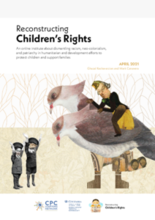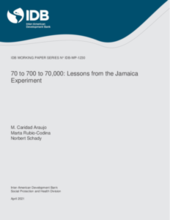Displaying 81 - 90 of 947
In this webinar, prevention experts discuss the process, experiences, and challenges of the ongoing integration of IPV prevention and gender into the Investing in Children and their Societies (ICS) Skilful Parenting Programme, and inclusion of VAC in the Indashyikirwa couples IPV prevention programme.
This study aimed to test whether a home‐visiting intervention could improve early attachment relationships between adolescent mothers and their infants living in poverty in Brazil.
The goal of the Reconstructing Children’s Rights Institute is to raise awareness and recognition of how racism, patriarchy, and power permeate the international child rights and child protection field. This first conversation examines the larger ecosystems of international development, humanitarian aid, international relations, and peace and security, and unpacks the colonial vestiges and power imbalances intrinsic to these larger contexts.
This document compares three versions of the same home visiting model, aimed at improving parent-child interactions and child development: the well-known Jamaica model, which was gradually scaled up from an efficacy trial (‘proof of concept’) in Jamaica, to a pilot in Colombia, to an at-scale program in Peru.
This study experimentally tested proximal outcomes of Connecting, a low-cost, self-directed, family-based substance-use prevention program for foster families.
This series of webinars organized by the CSO Forum Secretariat together with AfECN, UNICEF and WHO sought to strengthen the capacity of CSOs in the area of ECD to ensure greater advocacy for young children in the child rights agenda.
For this article, a review of what is currently known about intensive intervention with families where there is risk of a child removal was undertaken to explore the challenges that might arise in New Zealand's bi‐ and multi‐cultural environment.
In this webinar, UNICEF’s Lauren Rumble and Alessandra Guedes describe how violence in childhood is gendered, introduce the links between violence against women and children, and share effective gender-transformative strategies.
This article examines pilot results for the culturally adapted Weaving Healthy Families (WHF) program to promote resilience and wellness while preventing substance abuse and violence among Native American (NA) families.
This study describes the challenges faced by a child protection agency and community organization who partnered to reduce the overrepresentation of Black children reported to the child protection agency through implementation of a parenting support program.


